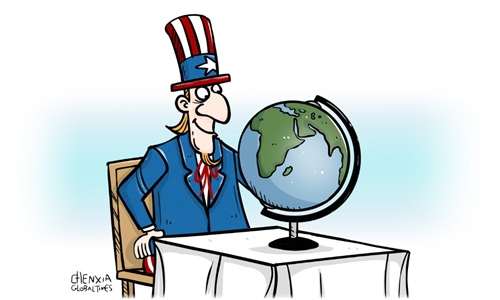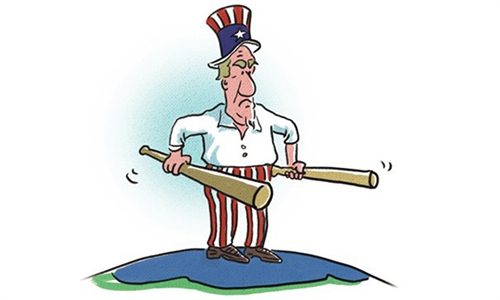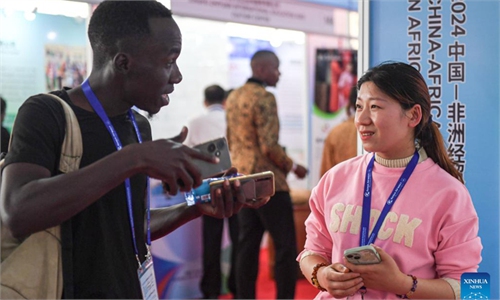Rwanda seeks closer cooperation with China in infrastructure, emerging industries: ambassador
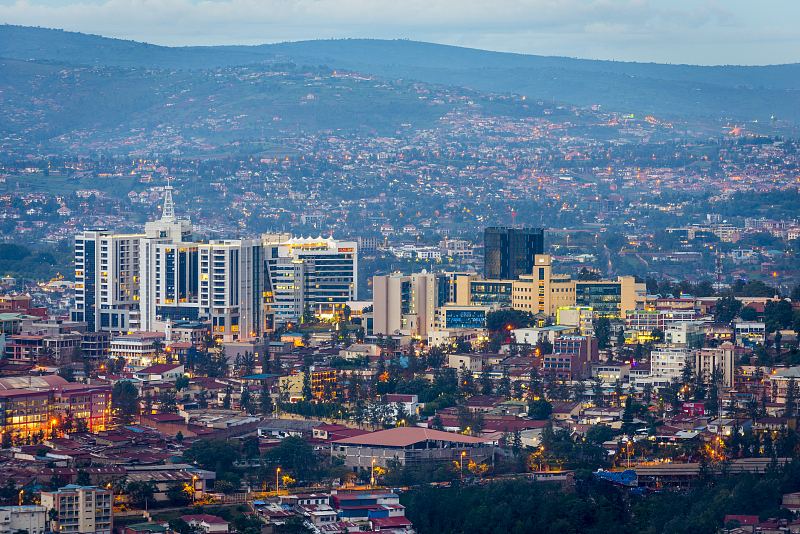
Kigali, the capital of Rwanda Photo: CFP
Editor's Note:
China and Rwanda have cultivated a robust relationship marked by mutual respect and cooperation. Guided by the heads of state of both countries, bilateral ties have flourished. Rwanda, a proactive participant in the China-proposed Belt and Road Initiative (BRI), has benefited from enhanced infrastructure and trade connections with China. In an interview with Global Times reporter Ma Jingjing and Zhang Yiyi (GT), Rwandan Ambassador to China James Kimonyo (Kimonyo) discussed expanding economic and trade cooperation between China and Rwanda, highlighting new opportunities for bilateral collaboration.
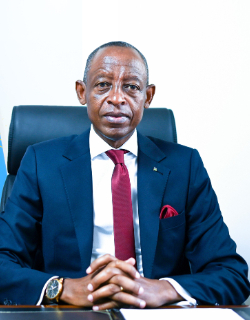
Rwandan Ambassador to China James Kimonyo Photo: Courtesy of Embassy of the Republic of Rwanda
GT: How has the Belt and Road Initiative (BRI) contributed to Rwanda's development since the country joined the China-proposed initiative in 2018?
Kimonyo: Rwanda and China have enjoyed warm and friendly relations, highlighted by high-level engagements. In July 2018, Rwanda signed several cooperation agreements with China, covering socioeconomic activities, health, agriculture, trade, investment, and infrastructure.
The BRI aims to connect the world through infrastructure, financial inclusion, trade, and people-to-people exchanges. Numerous projects have been implemented in Rwanda, enhancing infrastructure, increasing trade between the two countries, and fostering people-to-people connections.
When you look at the portfolio of Rwanda in this particular initiative, China has immensely contributed to the development of Rwanda through different projects funded under BRI. Under the Forum on China-Africa Cooperation (FOCAC), BRI also provides another avenue to provide resources to different African countries, including Rwanda.
We have seen growth in all those areas, especially in the area of infrastructure and health. We have hydropower infrastructure that has been developed. We have road infrastructure that has been constructed across the country in addition to hospitals and schools.
GT: Rwanda aims to become a middle-income country by 2035 and a high-income country by 2050. How will the BRI contribute to achieving these goals?
Kimonyo: Vision 2035 focuses on three strategic programs: infrastructure development, social development, and transformational governance. These pillars align with the opportunities provided by the BRI in social, economic, and governance development. Vision 2050 aims to transform Rwanda into a high-income country, emphasizing agriculture as an income-generating activity and addressing urbanization and globalization. The BRI supports these visions by providing resources for infrastructure and trade, facilitating Rwanda's access to the Chinese market, and contributing to economic transformation through technology and e-commerce. The BRI has been instrumental in supporting Rwanda's socioeconomic transformation through collaboration with the Chinese government.
GT: This year, China and Rwanda will celebrate 53rd anniversary of the establishment of diplomatic ties. How can one best describe the relations between the two countries over the past decades?
Kimonyo: Bilateral cooperation between China and Rwanda has been highly productive, fostering mutual growth through various programs and initiatives. At our latest forecast session, we reported significant progress in ongoing projects. We look forward to the upcoming FOCAC in Beijing, where Rwanda and other African leaders will discuss continued collaboration with China. This forum will review past commitments and plan for the future, focusing on infrastructure, agriculture, urbanization, technology, and people-to-people exchanges. Our goal is to ensure the forum's success, positively impacting lives and driving progress. We are pleased with the level of cooperation and eagerly anticipate continuing our partnership with China to achieve shared prospects.
GT: Beyond agriculture, what other areas do you see for potential cooperation between the two countries in the future?
Kimonyo: In recent years, we've collaborated closely with the Chinese government and appreciate their efforts in opening green lanes for African and Rwandan agricultural products to reach the Chinese market. China's initiatives have provided great opportunities for African nations. Following expos, numerous contracts have been signed between Chinese and African companies, boosting the presence of Rwanda's products in the Chinese market. We've also utilized technology platforms through livestreaming to reach consumers and buyers. However, there is still a challenge of meeting the demand. We are therefore strategically engaging Chinese enterprises with the support of the Chinese government to invest in agriculture to enhance production in coffee, chili, avocado, soya beans and so on. We shall focus on technology transfer to add value in order to create jobs and significant economic impact. Other areas include mining sector, industrial development, infrastructure, energy development and education.
We are also trying to diversify our cooperation beyond market presence. Renewable energy is a focus to address environmental concerns, along with partnerships in healthcare to enhance human capital and technology.
Productivity is crucial for African countries, with over 70 percent [of them] depending on agriculture. We're working with China to increase production and introduce new products like avocados and minerals to the Chinese market. Collaboration with Chinese companies aim to improve mineral processing and enhance economic growth. We're also exploring partnerships in research and development, particularly in small industries, to join global value chains. Through collaboration with China, we're addressing socioeconomic needs and adapting strategies to meet specific country conditions. Our engagement aims to create diverse opportunities for mutual benefit, fostering common achievements through cooperation.
Regional infrastructure development is fundamental to cooperation and will significantly reduce transportation costs, fostering opportunities in manufacturing and other sectors. Ensuring a secure energy supply is crucial for increased productivity and exports within Africa. In addition to ongoing projects, prioritizing regional infrastructure, energy, and connectivity is essential to facilitate seamless transactions. We recognize China's leadership in technology and see significant opportunities in e-commerce and education collaboration. China's support for education, such as the Smart Education Project [a program rolled out by the Ministry of Education of Rwanda to enhance the accessibility of Information Communication Technology in education], underscores our shared commitment to innovation. Expanding such initiatives will leverage interconnected networks' benefits.
Strengthening trade ties with China is vital for our economic growth. We aim to enhance exports, attract investment, and develop manufacturing facilities. Chinese enterprises have thrived in our conducive business environment, reflecting the mutual benefits of our partnership. We welcome more Chinese investments in Rwanda's manufacturing sector, leveraging government-provided industrial parks and infrastructure support. Looking ahead, we are optimistic about the future of our collaboration with China. The commitment of both governments and the readiness of our people bode well for continued success. The growing presence of Rwandan businesspeople in China and Chinese groups in Rwanda demonstrates our strengthening bilateral ties. We remain open to further collaboration, investment, and business opportunities, ensuring a mutually beneficial partnership between our countries.
GT: A number of Western media outlets claim the China-Africa cooperation is a "one-sided deal" whereby China benefits or profits from Africa. What are your comments on this claim?
Kimonyo: Africans have collaborated with China for decades, based on mutual respect and national priorities. China has supported Africa even before its economic rise, exemplified for instance the Tazara railway connecting Tanzania and Zambia, built long time ago. This shows that the friendship isn't merely materialistic.
Chinese-supported projects in Africa align with the national priorities of the respective countries. China never imposes its agenda; instead, it asks what Africa needs or responds to African requests for project financing. Claims of China "trapping Africa in debt" are unfounded and aimed at undermining their cooperation. Some countries struggle with debt, but this isn't unique to Chinese loans and isn't a deliberate "trap."
China offers high-quality projects at competitive prices. For instance, Chinese companies can build the same quality road at half the cost of other companies. African countries choose Chinese firms not because they are Chinese but because they are competitive, delivering more value for money.
China supports Africa in good faith, just as Africa supports China. The notion that China is "exploiting" Africa is baseless and harmful. China-Africa relationship is built on mutual respect, and the projects benefit both sides through fair and competitive practices.
GT: How does Rwanda view the Western narrative about "overcapacity" in China's new-energy sector?
Kimonyo: It is unfair to describe China as a country with "overcapacity." What I appreciate about this country is the fact that its leadership consistently talks about sharing prosperity. Because of that philosophy, China has been supporting countries, even while it is still in the process of transforming itself.
Now, China has successfully achieved rural revitalization, now focusing on high-quality development which focuses on deploying new-quality productive forces to ensure accelerated green growth. These are efforts to ensure it reaches the development level of other countries. The path that China has taken is positive and inspirational for other developing nations. China is on the right path to develop itself while contributing to global development.
